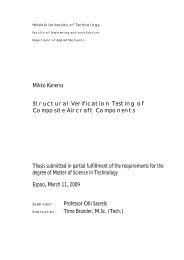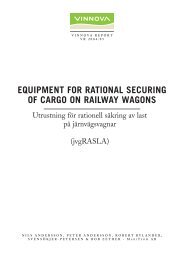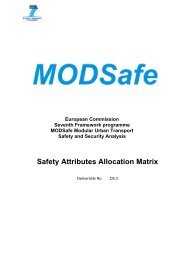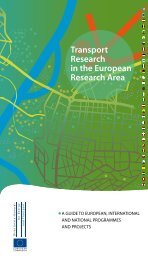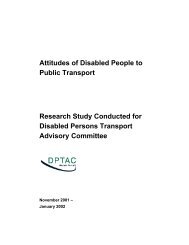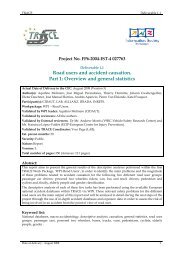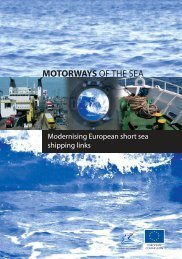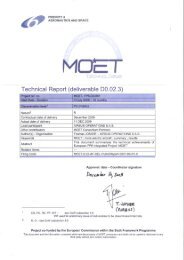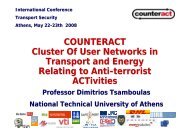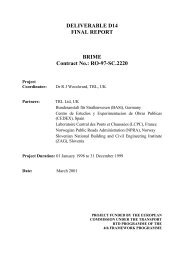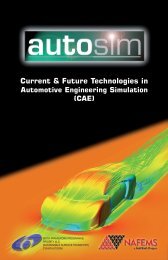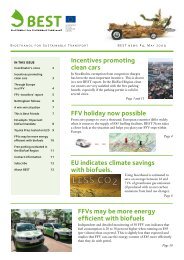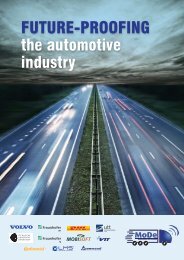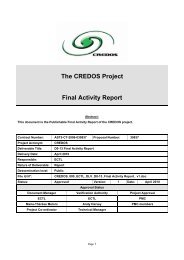Publicly funded automotive research in EU.pdf - EAGAR
Publicly funded automotive research in EU.pdf - EAGAR
Publicly funded automotive research in EU.pdf - EAGAR
You also want an ePaper? Increase the reach of your titles
YUMPU automatically turns print PDFs into web optimized ePapers that Google loves.
<strong>EAGAR</strong> – <strong>Publicly</strong> <strong>funded</strong> <strong>automotive</strong> <strong>research</strong> by the European Commission<br />
2.5 The efficiency, flexibility, and experienced bureaucracy of the fund<strong>in</strong>g process<br />
The flexibility to release new calls <strong>in</strong> response to chang<strong>in</strong>g situations<br />
The current calls and targets show that the <strong>EU</strong> tries to respond to the new requirements of the market<br />
and to the new environmental issues. The <strong>EAGAR</strong>-related topics, <strong>in</strong> particular the European<br />
Green Cars Initiative, aim at both promot<strong>in</strong>g advanced technologies with a ma<strong>in</strong> focus on decarbonisation<br />
of road transport, but also to support the recovery of the <strong>automotive</strong> <strong>in</strong>dustry.<br />
The application process<br />
The European Commission issues calls for proposals <strong>in</strong> accordance to the requirements laid down <strong>in</strong><br />
the relevant annual Work Programmes. The Work Programmes are normally published annually and<br />
<strong>in</strong>clude all the relevant <strong>in</strong>formation on the topics covered and on the upcom<strong>in</strong>g calls. Between one<br />
and two calls are launched per year and programme. Up-to-date <strong>in</strong>formation on the exist<strong>in</strong>g (or<br />
“open”) and for past calls and other enquiries is provided by the Cordis website<br />
(http://cordis.europa.eu)<br />
The proposals received are ranked through a peer review procedure, which <strong>in</strong>volves an evaluation<br />
prepared by <strong>in</strong>dependent experts. If the project proposal is selected, the negotiation of the contract<br />
between the European Commission and the project coord<strong>in</strong>ator can start. The grant agreement<br />
needs to be signed by every consortium participants and it will form the basis of their rights and obligations<br />
towards the Commission dur<strong>in</strong>g the period of the project. A survey among <strong>automotive</strong> <strong>research</strong><br />
managers, experienced with European and national fund<strong>in</strong>g programmes showed that the<br />
average time for the proposal assessment process, mean<strong>in</strong>g the time from proposal submission until<br />
notification of the evaluation result is between 3 and 6 months. From this notification and the start<br />
of contract negotiations most projects need more than 6 months to start. However, latencies up to<br />
18 months are not unusual. One third of the projects could start between 3 and 6 months after positive<br />
assessment.<br />
(#13) How long does the proposal<br />
assessment process take?<br />
< 1 month 1-3 months 3-6 months<br />
> 6 months Not known<br />
Figure 10: How long does the proposal assessment process take?<br />
Regard<strong>in</strong>g the flexibility of the FP7 programmes it is noticeable that the accommodation of new topics<br />
is regarded as very well. This matches the estimation that the <strong>EU</strong> can react on new topics quickly.<br />
Nevertheless, a third of the applicants did not experience such flexibility. Reason is perhaps the fact<br />
that there is usually only one call per programme per year. Figure 10 below about flexibility to slightly<br />
amend the objectives and tasks of a project dur<strong>in</strong>g its duration is drawn from the feedback of the<br />
above mentioned <strong>research</strong> managers. The majority (80 %) experienced flexibility whilst their projects<br />
were runn<strong>in</strong>g. In 20 % of the cases the reaction of the <strong>EU</strong> was rated as not very flexible.<br />
17/57



